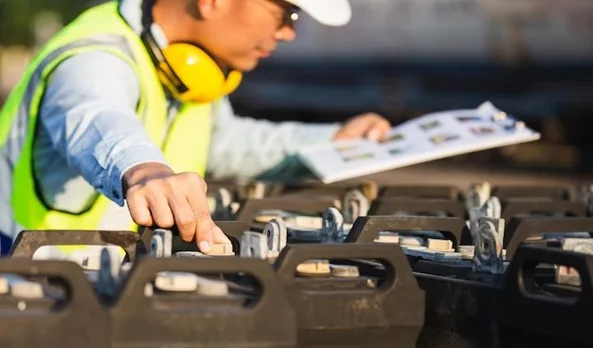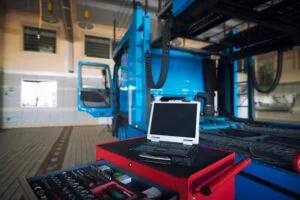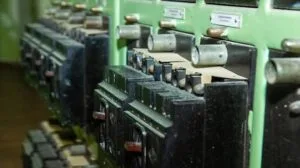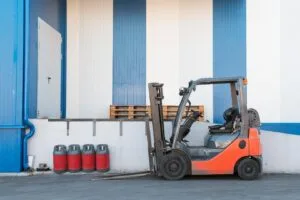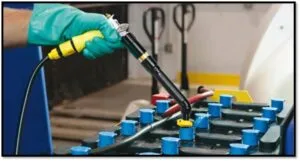Forklifts are essential tools for many industries, particularly in warehouses, factories, and distribution centers. However, like all machinery, forklifts come with risks that need to be managed to maintain a safe and efficient workplace. One of the most common and dangerous issues forklift operators face is battery overheating. Overheated forklift batteries not only reduce efficiency but can also lead to safety hazards such as fires or explosions.
At Industrial Batteries Accessories Ltd., we understand the importance of preventing forklift battery overheating and improving safety on worksites. In this blog, we’ll explore the causes of forklift battery overheating, the risks associated with it, and most importantly, how you can prevent it. By following these tips and best practices, you’ll ensure the safety of your employees and maximize the efficiency of your forklift fleet.
Why Forklift Battery Overheating Happens
Forklift batteries, especially lead-acid batteries, generate heat during charging and discharging. When the temperature gets too high, it can damage the battery and affect the forklift’s performance. Battery overheating typically occurs due to a variety of factors, and understanding the causes can help you take steps to prevent it.
- Overcharging: Charging a forklift battery for too long or at a too-high voltage can cause it to overheat. Overcharging generates excess heat and accelerates battery wear.
- Poor ventilation: Batteries need proper airflow to dissipate heat. Poorly ventilated charging areas or storage spaces trap heat, causing the battery to overheat.
- Frequent use without breaks: Constant use without giving the battery time to cool down can lead to excessive heat buildup. Forklifts should have scheduled breaks to ensure batteries don’t overheat.
- Improper charging equipment: Using outdated or faulty chargers can result in improper charging cycles that lead to overheating. It’s important to use the correct charger designed for your forklift’s battery type.
- Environmental factors: Extreme temperatures, particularly hot weather, can contribute to overheating. Working in environments with high ambient temperatures can raise the temperature of the battery.
Risks of Forklift Battery Overheating
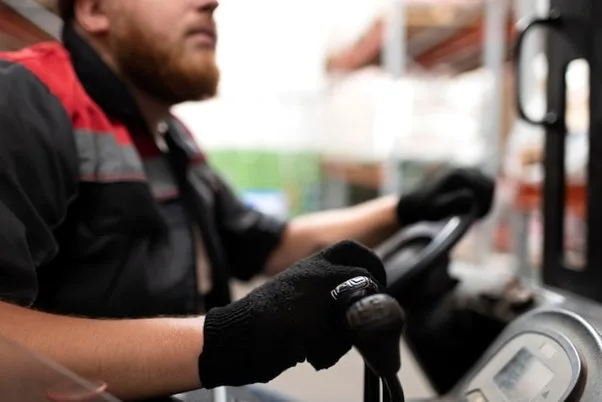
Forklift battery overheating isn’t just an issue for efficiency—it’s also a serious safety concern. Here are some of the risks associated with an overheated forklift battery:
- Battery Damage: Overheating can cause irreversible damage to the battery’s internal components, reducing its lifespan and performance.
- Fire Hazards: Overheated batteries can catch fire, posing a serious threat to workers and property. Lead-acid batteries, in particular, can emit hydrogen gas when overheated, which is highly flammable.
- Reduced Efficiency: When batteries overheat, they lose their ability to hold a charge, causing the forklift to run less efficiently. This can result in frequent downtime and decreased productivity.
- Health Risks: In extreme cases, battery leaks or explosions from overheating can expose workers to harmful chemicals, including sulfuric acid, which can cause burns or respiratory issues.
- Costly Repairs and Replacements: Constant overheating leads to premature wear, meaning you’ll have to replace the batteries more often. This increases the maintenance costs for your fleet.
How to Prevent Forklift Battery Overheating
Now that we know the causes and risks, let’s focus on how to prevent forklift battery overheating. Preventing overheating is all about following the right charging practices, ensuring proper ventilation, and providing your forklifts with the care they need.
- Proper Charging Practices: One of the most important ways to prevent overheating is to follow the correct charging procedures. Never leave your forklift battery on the charger for longer than necessary. Use an automatic charger that stops charging when the battery is full to avoid overcharging.
- Choose the Right Charging Equipment: Always use the correct charger for your forklift battery type. A charger that doesn’t match your battery’s specifications can cause improper charging cycles and lead to overheating.
- Monitor Battery Temperature: Some forklift models have built-in temperature sensors that monitor the battery’s temperature. If you notice the temperature getting too high, stop the charging process and allow the battery to cool down before continuing.
- Avoid Charging in High Temperatures: Ensure that the charging area is cool and well-ventilated. Charging batteries in a hot environment can exacerbate the overheating problem. Ideally, charge your batteries in a room that is between 50°F and 80°F (10°C – 27°C).
- Give Batteries Breaks: Just like any piece of machinery, forklift batteries need rest. Avoid continuous operation without giving the batteries time to cool down. Schedule breaks and allow the battery to cool between charging and usage.
- Ensure Proper Ventilation: Proper ventilation is essential for preventing overheating. Ensure that your charging area is equipped with fans or ventilation systems to help dissipate heat. Avoid charging batteries in tight, enclosed spaces without airflow.
- Check for Battery Damage Regularly: Regularly inspect your forklift batteries for any signs of damage or wear. If the battery is bulging, leaking, or showing signs of excessive heat, replace it immediately to avoid further problems.
Forklift Battery Maintenance: Regular Checks for Better Performance
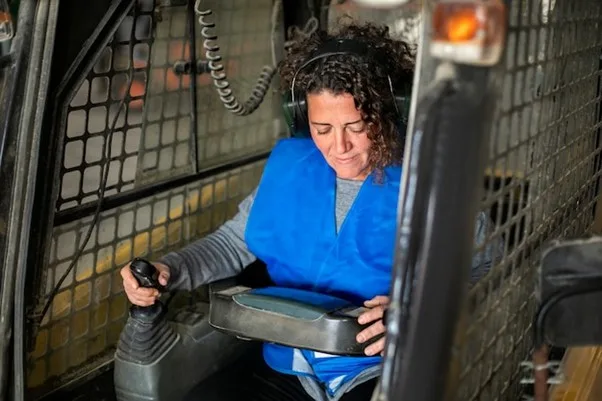
Regular maintenance of forklift batteries is essential for preventing overheating and ensuring safe operation. Here are some key maintenance tasks you can do to keep your forklift batteries in peak condition:
- Check Electrolyte Levels: For lead-acid batteries, low electrolyte levels can cause the battery to overheat. Regularly check and refill the electrolyte levels with distilled water if needed.
- Clean the Battery Terminals: Corrosion on battery terminals can cause poor conductivity, which may lead to overheating. Clean the terminals with a solution of baking soda and water to prevent corrosion build-up.
- Test Battery Performance: Use a voltmeter to check the voltage of the forklift battery. If the battery isn’t performing well or doesn’t hold a charge, it might be overheating due to internal damage and may need replacing.
- Examine the Charging System: Ensure your charging system is functioning properly. A malfunctioning charger can result in overheating and other issues with the battery. Regularly inspect the charger and replace it if necessary.
Best Practices for Forklift Battery Charging and Use
Implementing best practices for charging and using forklift batteries will go a long way in preventing overheating and improving safety on your worksites. Here’s a list of recommended practices:
- Charge Forklifts During Off-Peak Hours: Charge your forklifts during off-peak hours when they are not in use. This helps ensure that the battery is charged properly without the risk of overheating due to extended charging periods.
- Avoid Quick Charging: Quick charging, though convenient, can generate excessive heat. If possible, avoid rapid charging and use a charger that offers a slower, more controlled charge cycle.
- Train Operators and Maintenance Staff: Educate forklift operators and maintenance staff on the importance of preventing overheating. Proper training ensures that they follow the correct charging and maintenance procedures.
- Use Lithium-Ion Batteries: If you are looking to reduce the risk of overheating altogether, consider switching to lithium-ion batteries. These batteries charge faster, generate less heat, and require less maintenance compared to traditional lead-acid batteries.
Lead-Acid vs. Lithium-Ion Batteries
Frequently Asked Questions (FAQs)
Q1: How can I tell if my forklift battery is overheating?
You may notice that the battery feels unusually hot to the touch, emits a strong smell, or causes the forklift to lose power quickly. If you notice these signs, stop using the forklift and allow the battery to cool down.
Q2: How can I prevent battery overheating in extreme heat?
Ensure your forklift’s charging station is in a cool, well-ventilated area. Avoid charging forklifts in direct sunlight or in hot environments, and consider using cooling fans in the charging area.
Q3: Can forklift battery overheating cause permanent damage?
Yes, overheating can cause permanent damage to the internal components of the battery. It can reduce its lifespan, decrease its performance, and even lead to safety hazards like fires.
Q4: Is it better to use a lead-acid or lithium-ion battery for preventing overheating?
Lithium-ion batteries generally have a lower risk of overheating compared to lead-acid batteries. They also charge faster and require less maintenance.
Conclusion
Preventing forklift battery overheating is crucial for ensuring both the safety and efficiency of your forklift fleet. By understanding the causes of overheating, monitoring your batteries regularly, and following best charging practices, you can reduce the risks associated with overheating and extend the life of your forklift batteries. Remember, a well-maintained forklift battery leads to a safer work environment and improved productivity.
At Industrial Batteries Accessories Ltd., we are dedicated to providing the highest quality forklift batteries and charging solutions to help you maintain a safe, efficient, and productive workplace.

